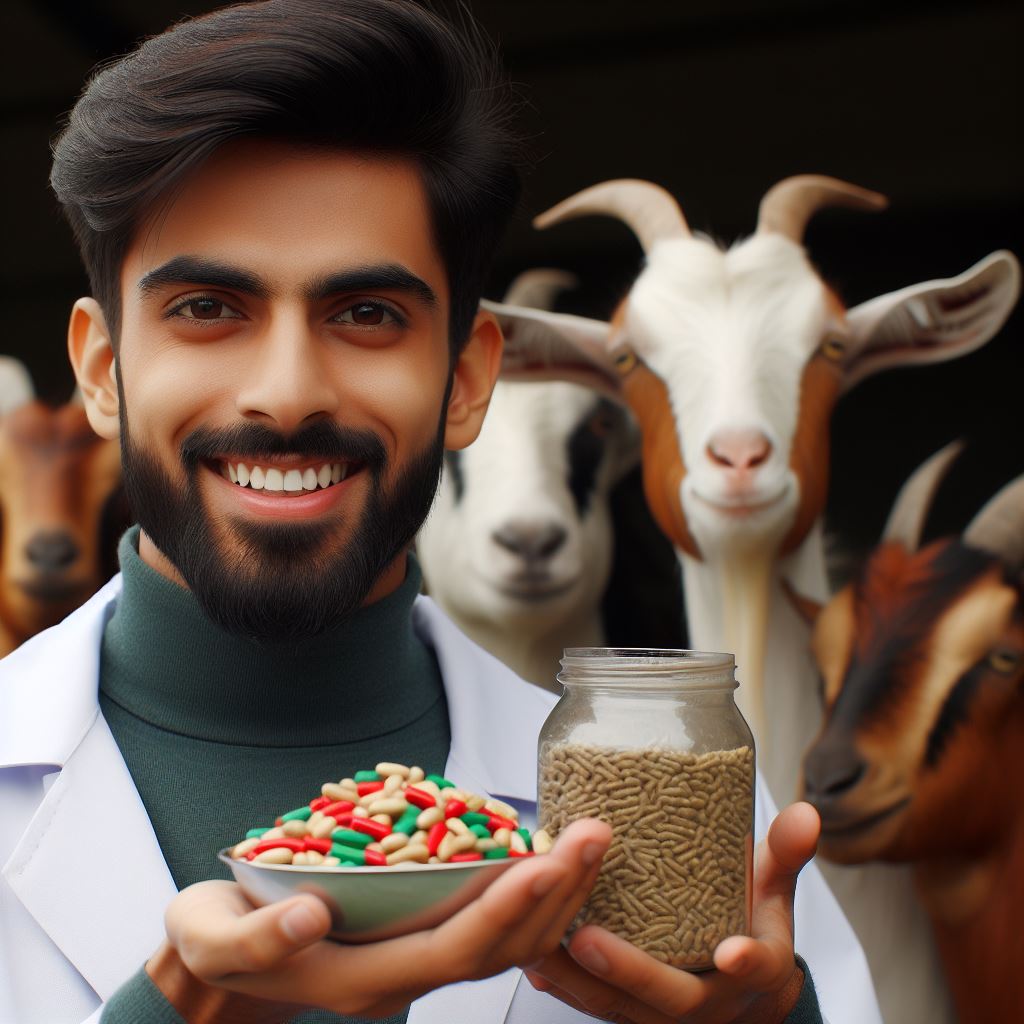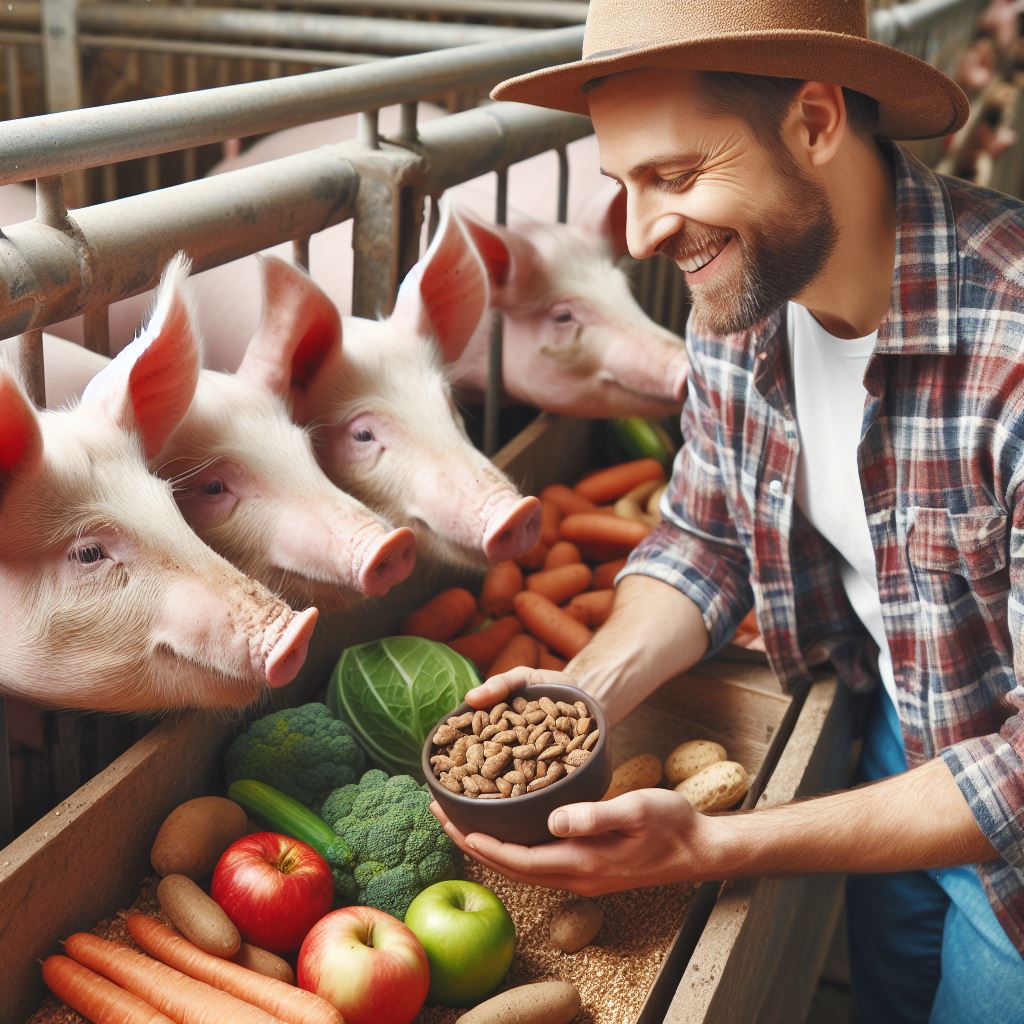Introduction
Importance of optimal goat feed
A healthy diet is crucial for goats as it directly impacts their growth, reproduction, and disease resistance.
By providing optimal feed, goats can maintain a healthy body condition score and overall well-being.
Goat feed should consist of a variety of forages, grains, minerals, and vitamins to meet their dietary requirements.
Improper balance of nutrients can lead to deficiencies or excesses, causing health issues in goats.
Brief overview of balancing nutrition and health in goat feed
Moreover, a well-balanced diet ensures goats have enough energy for daily activities and proper functioning of their immune system.
To achieve an optimal goat feed, it is essential to understand the specific nutritional needs of goats at different life stages.
For example, lactating does have higher energy and protein requirements compared to dry does.
Proper management of goat feed involves regular monitoring of body condition and adjusting the diet accordingly.
Incorporating good feeding practices, such as feeding at consistent times and avoiding abrupt diet changes, also contributes to optimal goat feed.
Additionally, it is crucial to consider the quality and safety of the feed to prevent contamination and improve overall health.
Therefore, providing goats with optimal feed is vital to maintain their health and productivity.
Balancing nutrition and health in goat feed requires an understanding of their specific dietary requirements.
By ensuring a well-balanced diet and implementing good feeding practices, goats can thrive and stay healthy.
Understanding the nutritional needs of goats
Goats have specific nutritional needs to maintain their health and wellbeing.
Understanding these needs is vital for goat owners to provide a well-balanced diet.
Transform Your Agribusiness
Unlock your farm's potential with expert advice tailored to your needs. Get actionable steps that drive real results.
Get StartedThe nutritional requirements of goats can be classified into macronutrients and micronutrients, along with their water requirements.
Essential macronutrients for goats
Protein
Protein is a crucial macronutrient for goats as it aids in growth, repair of body tissues, and supports the immune system.
It is essential for the development of muscles, organs, and milk production.
Goats can obtain protein from sources such as pasture, hay, and legume forages.
Carbohydrates
Carbohydrates are the primary source of energy for goats.
They are necessary for maintaining body temperature, supporting physical activity, and promoting proper rumen function.
Carbohydrates can be derived from sources like grains, hays, and forages.
Fats
Fats are another important macronutrient for goats as they provide energy and serve as a source of essential fatty acids.
They play a vital role in maintaining healthy skin, hair, and hooves.
Fats can be obtained from sources like vegetable oils and oilseeds.
Key micronutrients for goat health
Vitamins
Vitamins are essential micronutrients that goats require for various physiological processes and overall health.
They play a crucial role in maintaining a strong immune system, promoting proper growth, and supporting reproductive functions.
Vitamins can be obtained from green forages, supplements, and commercial feeds.
Minerals
Minerals are vital for goats as they are involved in the formation of bones, teeth, and proper nerve function.
They also contribute to muscle contraction, enzyme function, and hormone regulation.
Common minerals required by goats include calcium, phosphorus, magnesium, copper, zinc, and selenium.
These minerals can be supplied through mineral supplements, forages, and commercial feeds.
Water requirements for goats
Water is essential for goats to maintain proper hydration.
It aids in digestion, nutrient absorption, regulation of body temperature, and overall metabolic functions.
Goats should have access to clean and fresh water at all times, especially during hot weather or lactation periods.
Providing goats with a well-balanced diet that includes the necessary macronutrients, micronutrients, and adequate water will ensure their overall health and productivity.
Regular monitoring of their nutrition and making necessary adjustments based on their specific needs will help in preventing deficiencies or imbalances and promote optimal goat health and performance.
Read: Best Feed Types for Beef Cattle: A Nutritional Guide
Common types of goat feed
When it comes to feeding goats, it is essential to provide them with a balanced diet that meets their nutritional needs.
Showcase Your Farming Business
Publish your professional farming services profile on our blog for a one-time fee of $200 and reach a dedicated audience of farmers and agribusiness owners.
Publish Your ProfileThere are several common types of goat feed that can help achieve this goal.
Hay
Hay is a staple in a goat’s diet and is typically made from dried grasses or legumes.
Different types of hay can provide varying nutritional benefits.
Different types of hay
Goats can be fed various types of hay, including alfalfa, timothy, orchard grass, and clover hay.
Nutritional value of various hays
Hays differ in their nutritional content, with alfalfa hay being high in protein, calcium, and energy, while grass hays are lower in protein but higher in fiber.
Grains
Grains can be an important part of a goat’s diet, providing them with additional energy and nutrients.
However, it is crucial to choose suitable grains and determine the right quantity to feed.
Types of grains suitable for goats
Common grains suitable for goats include oats, barley, corn, and wheat.
These grains are rich in carbohydrates.
Determining the quantity of grains to feed
The quantity of grains to feed depends on factors such as the goat’s age, weight, activity level, and overall health.
It is important not to overfeed grains to prevent digestive issues.
Pellets and concentrates
Pellets and concentrates are commercially prepared goat feeds that offer convenience and concentrated nutrition.
However, there are some considerations when using these types of feed.
Benefits and considerations of using pellets
Pellets are convenient to feed and can ensure goats receive a balanced mix of nutrients.
However, they may be more expensive than other feed options.
Nutritional content of concentrates
Concentrates, such as grain-based mixes, provide higher levels of nutrients than forage alone.
They can be beneficial for goats with higher nutrient requirements.
Forage and browsing
Allowing goats to forage and browse on vegetation can provide additional nutrition and mental stimulation.
Care must be taken to ensure they consume safe and nutritious plants.
Benefits of allowing goats to forage
Foraging allows goats to access a variety of plant species, which can contribute to a more diverse and complete diet.
It also promotes natural behavior and exercise.
Identifying safe and nutritious plants for browsing
It is important to identify safe plants for goats to browse, such as blackberry bushes, raspberry canes, and certain tree leaves, while avoiding toxic plants like rhododendron and hemlock.
Most importantly, a well-balanced diet for goats should include a combination of hay, grains, pellets or concentrates, and the opportunity to forage.
Understanding the different types of feed available and their nutritional value is crucial to ensure optimal goat health and nutrition.
Read: Duck Health Management & Disease Control
Principles of balancing nutrition and health
Understanding the specific needs of different goat breeds
- Each goat breed has unique nutritional requirements that must be met for optimal health.
- Research and understand the specific dietary needs of the goat breed you are raising.
- Consult with experts or veterinarians to ensure you are providing the right nutrients.
Age-related nutritional requirements
- Goats have different nutritional needs at different stages of life.
- For young kids, milk or milk replacer must be the primary source of nutrition.
- As goats grow, their diet should include hay, grains, and supplements to support their development.
- Older goats may require a diet with reduced protein and increased fiber content.
Adjusting feed according to the goat’s physiological state
- Pregnant or lactating goats have increased nutritional needs.
- Offer more concentrated feed and supplements to meet the demands of pregnancy or milk production.
- Ensure access to clean water as it is essential for digestion and overall well-being.
Monitoring and adjusting feed intake based on health and condition
- Regularly monitor the body condition and weight of your goats.
- If a goat is underweight, increase the feed amount or consider adding high-calorie supplements.
- If a goat is overweight, reduce the feed amount and provide more exercise opportunities.
- Observe the general health of your goats, such as coat condition, energy levels, and overall behavior.
By following these principles, you can ensure that your goats receive the optimal nutrition they need to stay healthy.
Understanding the specific needs of different goat breeds is crucial because their requirements may vary significantly.
Additionally, considering age-related nutritional requirements allows you to provide appropriate feed for different stages of life.
Furthermore, adjusting feed according to the goat’s physiological state is essential.
Pregnant or lactating goats have higher nutrient demands, and adjusting their diet accordingly ensures their health and the health of their offspring.
Monitoring and adjusting feed intake based on health and condition allows you to maintain an ideal body condition for your goats.
Regularly evaluate your goats’ weight and body condition to identify any changes that may indicate nutritional imbalances.
If necessary, consult with experts or veterinarians for guidance on adjusting the feed amounts or composition.
Stay attentive to the general health and behavior of your goats, as it can provide valuable insight into their nutritional status.
Remember that providing proper nutrition for your goats goes beyond just feeding them.
Access to clean water, adequate space, and exercise opportunities are also essential for their overall well-being.
Consider all these factors together to develop a comprehensive goat feeding plan that prioritizes optimal nutrition and health.
Read: 3 Top Smart Feeders for Efficient Cattle Rearing

Factors to consider in choosing goat feed
Cost-effectiveness
When selecting goat feed, it is crucial to consider the cost-effectiveness to ensure optimal financial management.
- Compare prices and analyze the nutritional value provided by different feed options.
- Look for discounts or bulk deals that can save you money without compromising nutritional needs.
- Keep in mind that the cheapest option may not always be the best choice if it lacks essential nutrients.
Availability
The availability of goat feed is essential to ensure a consistent and reliable supply for your herd.
Showcase Your Farming Business
Publish your professional farming services profile on our blog for a one-time fee of $200 and reach a dedicated audience of farmers and agribusiness owners.
Publish Your Profile- Research local suppliers or feed stores that offer a variety of goat feed options.
- Check if the feed you are considering is regularly stocked and readily accessible.
- Consider alternative feed sources or grains that might be plentiful in your region.
Nutritional content and quality
To maintain the health and productivity of your goats, carefully assess the nutritional content and quality of the feed.
- Evaluate the protein, carbohydrate, fat, vitamin, and mineral content of potential feed options.
- Ensure the feed meets the specific dietary requirements of different goat breeds and stages of development.
- Look for feed options that are free from contaminants, mold, or other potential health hazards.
Feeding preferences and behavior
Understanding your goats’ feeding preferences and behavior is vital in making the right feed choices.
- Observe your goats’ eating habits and preferred types of feed.
- Take into account any known allergies or sensitivities to certain ingredients.
- Provide options for goats to express their natural grazing behavior, such as offering fresh browse or pasture.
By carefully considering these factors, you can choose the most suitable goat feed that ensures proper nutrition and overall health for your herd.
Read: Turkey Health: Preventing Flock Diseases
Balancing feed quantity and quality
Determining the appropriate amount of feed for goats
When it comes to feeding goats, finding the right balance of quantity and quality is vital.
Determining the appropriate amount of feed for goats involves considering their body weight and nutritional requirements.
- Considering body weight: Goats’ body weight is a crucial factor when determining the appropriate amount of feed. Each goat has a different body size and will require a specific quantity of feed to meet its energy needs.
- Calculating feed ration: To ensure goats receive the necessary nutrients, it is essential to calculate the feed ration based on their nutritional requirements. This involves considering the goats’ age, reproductive status, and activity levels.
By taking these factors into account, goat owners can determine the appropriate quantity of feed to provide their goats, ensuring they meet their nutritional needs and maintain optimum health.
Ensuring feed freshness and avoiding spoilage
One aspect of balancing feed quantity and quality is ensuring the freshness of the feed.
Goats require fresh and nutritious feed to maintain their health and well-being.
To ensure feed freshness:
- Proper storage: Store feed in a cool and dry place to prevent moisture and mold growth.
- Regular inspections: Regularly inspect the feed for signs of spoilage, such as mold, foul odor, or unusual appearance. Discard any spoiled feed immediately.
- Rotating feed supply: Use the oldest feed first to prevent it from going bad. Properly rotate the feed supply to maintain freshness.
By following these guidelines, goat owners can ensure that their goats receive fresh and nutritionally-rich feed, which is essential for their overall health and productivity.
Controlling access to feed to prevent overeating or undernutrition
Controlling goats’ access to feed is another crucial aspect of balancing their nutrition and health.
Both overeating and undernutrition can have negative effects on the well-being of goats.
To control access to feed:
- Feeding schedule: Implement a set feeding schedule to regulate the amount of feed goats consume daily.
- Portion control: Ensure that each goat receives its proper share of feed, preventing overeating or undernutrition.
- Limit grazing time: If goats have access to pasture, limit their grazing time to control the intake of forage.
- Supplemental feeding: If necessary, provide supplemental feed to fulfill any nutritional gaps.
By managing goats’ access to feed, owners can prevent overeating, obesity, and nutritional deficiencies, leading to healthier and happier goats overall.
Health issues related to goat feed
Common nutritional deficiencies in goats
- Lack of essential minerals like calcium, phosphorus, and selenium can lead to weak bones and poor immune function.
- Insufficient protein intake can cause muscle wasting, reduced milk production, and compromised growth in young goats.
- Inadequate vitamin A can result in vision problems, decreased fertility, and weakened immune system.
Potential health risks of incorrect feed balance
- Overfeeding grains without proper roughage can cause ruminal acidosis, leading to severe digestive disturbances and even death.
- High energy diets lacking fiber can result in bloat, a life-threatening condition where the rumen fills with gas.
- Excessive amounts of starch-rich feed may disrupt the microbial population in the rumen and impact digestion.
- Imbalance between calcium and phosphorus ratios can lead to urinary calculi or kidney stones, primarily in male goats.
Signs of nutritional imbalances or health problems
- Weight loss, poor coat condition, and general lethargy could indicate a lack of proper nutrition.
- Anemia, characterized by pale gums and reduced red blood cell count, may be linked to iron deficiency.
- Swollen joints, lameness, and decreased milk production may point to a deficiency in essential minerals.
- Diarrhea, decreased appetite, and poor growth are common signs of nutritional imbalances that require attention.
- Behavioral changes such as aggression, excessive vocalization, or lack of interest in food can signal underlying health problems.
In essence, ensuring optimal goat feed is crucial for maintaining their health and preventing nutritional deficiencies.
Common deficiencies, including minerals, protein, and vitamins, can have severe consequences.
Moreover, incorrect feed balance can lead to various health risks like ruminal acidosis, bloat, and urinary calculi.
It is essential for goat owners to be vigilant and look out for signs of nutritional imbalances or health problems in their animals.
Timely interventions, such as adjusting feed ratios or consulting a veterinarian, can help address these issues and promote the overall well-being of goats.
Remember, a balanced and nutritious diet is the foundation for healthy and thriving goats, so take care in providing them with the best feed options available.
Supplementing Goat Feed
Types of supplemental feeds
- Grain: Offers energy and protein, but should be fed in moderation.
- Hay: Provides fiber and roughage, ensuring digestive health for goats.
- Forage: Fresh pasture or browse can serve as a natural supplement, promoting good nutrition.
- Silage: Fermented feed can be used as an alternative source of nutrition.
Using mineral blocks or salt licks
- Essential minerals: Blocks or licks should contain minerals such as calcium, phosphorus, and sodium.
- Health benefits: Ensures proper growth, bone development, and overall well-being for goats.
- Placement: Position mineral blocks or salt licks in an easily accessible area within the goat’s reach.
- Monitoring intake: Check the consumption levels regularly to ensure goats are getting adequate minerals.
Providing vitamins and mineral supplements as needed
- Deficiency analysis: Conduct regular check-ups to identify any nutrient deficiencies in the goat’s diet.
- Consult with a veterinarian: Seek professional guidance to determine the appropriate supplements for your goats.
- Vitamin A: Essential for vision, immune function, and reproduction in goats.
- Copper: Promotes proper growth and development, as well as aids in red blood cell formation.
- Selenium: Vital for immune function and thyroid regulation in goats.
- Zinc: Supports a healthy immune system and aids in overall growth and development.
- Dosage and administration: Follow the recommended guidelines provided by the veterinarian when supplementing vitamins and minerals.
- Avoid over-supplementation: Excessive amounts of certain vitamins and minerals can cause toxicity in goats.
- Balanced diet: Combine supplements with a well-balanced feed to ensure goats receive all necessary nutrients.
- Water availability: Ensure goats have access to clean and fresh water, especially when offering mineral supplements.
To attain optimal nutrition and uphold good health in goats, supplementing their feed is imperative.
Various supplemental feeds, including grain, hay, fresh pasture, browse, and silage, deliver essential energy, protein, fiber, and roughage.
Vital minerals like calcium, phosphorus, and sodium are crucial in mineral blocks or salt licks, ensuring proper growth and bone development.
Supplementing extends beyond minerals; vitamins (A, copper, selenium, and zinc) should be administered based on veterinarian deficiency analysis.
Adhering to guidelines prevents toxicity.
A balanced diet, combining supplements and well-rounded feeds, guarantees goats receive a complete nutrient spectrum.
Clean, fresh water is pivotal, especially with mineral supplements.
In short, goat feed supplementation spans grains, hay, forage, and silage. Essential minerals in blocks or licks promote optimal growth.
Vitamins and minerals, administered cautiously, ensure goats thrive with balanced nutrition, maintaining robust health.
Conclusion
Ensuring optimal goat feed is fundamental, guaranteeing the vitality, growth, and overall well-being of these animals.
The significance of providing a well-balanced diet cannot be overstated.
Practical tips for achieving this balance include incorporating diverse supplemental feeds, supplying essential minerals through blocks or licks, and administering vitamins and minerals cautiously.
To navigate the complexities of goat nutrition successfully, seeking personalized advice is encouraged.
Consulting with veterinarians and collaborating with nutrition experts allows for tailored recommendations based on the unique needs of your goat herd.
This personalized approach ensures that the health and nutritional requirements of your goats are met effectively, contributing to their overall thriving and sustained well-being.
As you embark on the journey of goat farming, remember that expert guidance is invaluable for optimizing nutrition and health in your herd.




